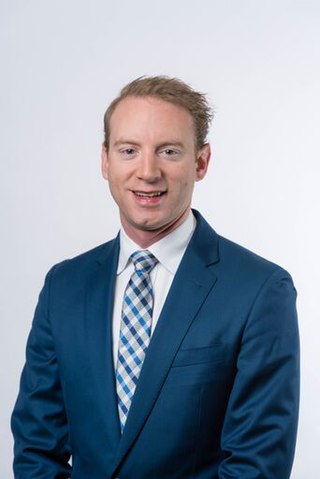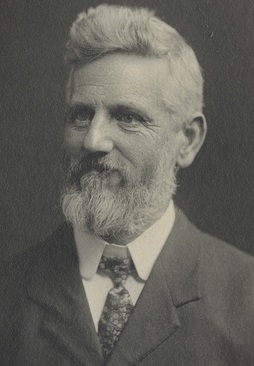Related Research Articles

The premier of South Australia is the head of government in the state of South Australia, Australia. The Government of South Australia follows the Westminster system, with a Parliament of South Australia acting as the legislature. The premier is appointed by the governor of South Australia, and by modern convention holds office by virtue of his or her ability to command the support of a majority of members of the lower house of Parliament, the House of Assembly.
The Liberal Party was a parliamentary party in Australian federal politics between 1909 and 1917. The party was founded under Alfred Deakin's leadership as a merger of the Protectionist Party and Anti-Socialist Party, an event known as the Fusion.

William Arthur Holman was an Australian politician who served as Premier of New South Wales from 1913 to 1920. He came to office as the leader of the Labor Party, but was expelled from the party in the split of 1916. He subsequently became the inaugural leader of the NSW branch of the Nationalist Party.

Crawford Vaughan was an Australian politician, and the Premier of South Australia from 1915 to 1917. He was a member of the South Australian House of Assembly from 1905 to 1918, representing Torrens (1905–1915) and Sturt (1915–1918). Elected for the United Labor Party, he served as Treasurer in the Verran government, succeeded Verran as Labor leader in 1913, and was elected Premier after the Labor victory at the 1915 state election.

Archibald Henry Peake was an Australian politician. He was Premier of South Australia on three occasions: from 1909 to 1910 for the Liberal and Democratic Union, and from 1912 to 1915 and 1917 to 1920 for its successor, the Liberal Union. He had also been Treasurer and Attorney-General in the Price-Peake coalition government from 1905 to 1909.
The Liberal and Democratic Union (LDU) was a South Australian political party formed by early liberals, as opposed to the conservatives. It was formed in 1906 when liberal party structures were becoming more solid. Its leader, Archibald Peake, stressed that the LDU represented 'something not so sharply set as Labourism, not so dull in its edge as conservatism'. But with Labor taking over the middle ground, Kingstonian liberals like Peake had to choose.
The Liberal Union was a political party in South Australia resulting from a merger between the Liberal and Democratic Union (LDU) and the two independent conservative parties, the Australasian National League and the Farmers and Producers Political Union (FPPU) as a response to Labor successes culminating in South Australia's first majority government at the 1910 election.

William Russell was a Scottish-born Australian politician. He was a liberal member of the South Australian Legislative Council from 1895 to 1900 and an Australian Labor Party member of the South Australian House of Assembly (Burra) (1901-1902) and the Australian Senate (1906-1912).

The Leader of the Opposition in South Australia is the leader of the largest minority political party or coalition of parties, known as the Opposition, in the House of Assembly of the Parliament of South Australia. By convention, the leader of the opposition is a member of the House of Assembly. The leader acts as the public face of the opposition, and acts as a chief critic of the government and ultimately attempt to portray the opposition as a feasible alternate government. They are also given certain additional rights under parliamentary standing orders, such as extended time limits for speeches. Should the opposition win an election, the Leader of the Opposition will be nominated to become the Premier of South Australia.

Elections were held in the colony of South Australia from 15 April to 6 May 1893. All 54 seats in the South Australian House of Assembly were up for election.

Colonial elections were held in South Australia on 25 April 1896, excepting the Northern Territory, which voted on 2 May. All 54 seats in the South Australian House of Assembly were up for election. The incumbent liberal government led by Premier of South Australia Charles Kingston in an informal coalition with the United Labor Party (ULP) led by John McPherson defeated the conservative opposition. Each district elected multiple members, with voters casting multiple votes.

Elections were held in the colony of South Australia on 29 April 1899, except for Albert, where the incumbent members were elected unopposed on 12 April, and Northern Territory, which voted on 6 May. All 54 seats in the South Australian House of Assembly were up for election. The incumbent liberal government led by Premier of South Australia Charles Kingston in an informal coalition United Labor Party (ULP) led by Lee Batchelor defeated the conservative opposition led by Leader of the Opposition John Downer. Each district elected multiple members, with voters casting multiple votes. Although the conservatives won more seats, the liberal government retained power until later that year, when new conservative leader Vaiben Louis Solomon forced the government to resign, but only held office for one week. The liberals held government until the next election through leaders Frederick Holder and John Jenkins.

State elections were held in South Australia on 27 May 1905. All 42 seats in the South Australian House of Assembly were up for election. The incumbent conservative government led by Premier of South Australia Richard Butler in an informal coalition with the liberals was defeated by the United Labor Party (ULP) led by Leader of the Opposition Thomas Price. Each of the 13 districts elected multiple members, with voters casting multiple votes.

State elections were held in South Australia on 3 November 1906, apart from the Northern Territory, which voted on 10 November. This was a double dissolution election, and in the South Australian House of Assembly, all 42 seats were up for election. The incumbent United Labor Party (ULP) government led by Premier of South Australia Thomas Price with coalition partner the Liberal and Democratic Union (LDU) led by Archibald Peake, defeated the conservative opposition led by Leader of the Opposition Richard Butler. Each of the 13 districts elected multiple members, with voters casting multiple votes.

State elections were held in South Australia on 2 April 1910. All 42 seats in the South Australian House of Assembly were up for election. The incumbent Liberal and Democratic Union (LDU) government led by Premier of South Australia Archibald Peake was defeated by the United Labor Party (ULP) led by John Verran. Each of the 13 districts elected multiple members, with voters casting multiple votes. The Peake LDU minority government had replaced the Price ULP/LDU coalition government in June 1909. The 1910 election was the first to result in a South Australian majority government. This came two weeks after the election of a first majority in either house in the Parliament of Australia at the 1910 federal election, also for Labor. Though a South Australian majority was won, the ULP did not take office until after the new lower house first met.

The Price-Peake Government is the name given to the coalition government in South Australia between 1905 and 1909 when Labor leader Tom Price led the government as Premier of South Australia with the support of the Liberal and Democratic Union (LDU) leader Archibald Peake as Treasurer of South Australia and Attorney-General of South Australia. Despite neither leader having Ministerial experience, the government they led was popular and successful.

The National Defence League (NDL) was an independent conservative political party, founded in 1891 by MLC Richard Baker in South Australia as an immediate response to the perceived threat from Labor. Though renamed the Australasian National League (ANL) in 1896, it was still often referred to by its former name. It lasted until the 1910 election, after which it merged with the Liberal and Democratic Union and the Farmers and Producers Political Union to become the Liberal Union.

Harry Jackson was an Australian politician who represented the South Australian House of Assembly seats of Stanley from 1906 to 1915 and Port Pirie from 1915 to 1918. He represented the United Labor Party until the 1917 Labor split, when he was expelled and joined the splinter National Party. He served as Speaker of the South Australian House of Assembly from 1911 to 1912.
This is a list of members of the South Australian House of Assembly from 1910 to 1912, as elected at the 1910 state election:

The Australian Labor Party (South Australian Branch), commonly known as South Australian Labor, is the South Australian Branch of the Australian Labor Party, originally formed in 1891 as the United Labor Party of South Australia. It is one of two major parties in the bicameral Parliament of South Australia, the other being the Liberal Party of Australia (SA Division).